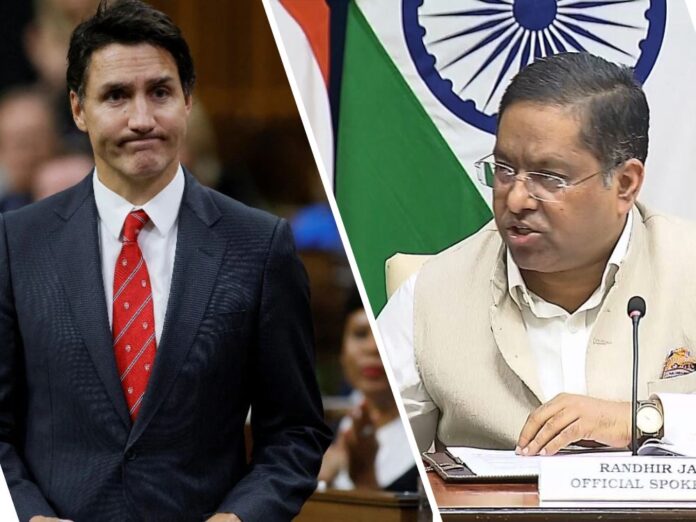New Delhi, October 17, 2024: After Canadian Prime Minister Justin Trudeau admitted that his government had not provided hard evidence when accusing India of involvement in the killing of Khalistani terrorist Hardeep Singh Nijjar, the Ministry of External Affairs (MEA) in India responded sharply. The MEA stated that Trudeau’s admission “only confirms” India’s consistent stance on the matter and held Trudeau responsible for damaging India-Canada relations.
“What we have heard today only confirms what we have been saying consistently all along—Canada has presented us no evidence whatsoever in support of the serious allegations that it has chosen to level against India and Indian diplomats,” said MEA spokesperson Randhir Jaiswal in an official statement following Trudeau’s comments on Wednesday.
Jaiswal further criticized Trudeau’s handling of the situation, saying, “The responsibility for the damage that this cavalier behavior has caused to India-Canada relations lies with Prime Minister Trudeau alone.”
Earlier, Trudeau testified before Canada’s foreign interference inquiry, revealing that India had repeatedly asked for evidence regarding the allegations related to Nijjar’s killing, but his government provided only intelligence, “not hard evidentiary proof.” Trudeau explained, “Behind the scenes, we were trying to get India to cooperate with us. Their ask was…give us the evidence you have on us. Our response was it is within your security agency. You should be looking into how much they know, you should be engaging… ‘No, no but show us the evidence’. At that point, it was primarily intelligence, not hard evidentiary proof. So we said let’s work together.”
Relations between India and Canada deteriorated after Trudeau alleged in the Canadian Parliament last year that his government had “credible allegations” of India’s involvement in the killing of Hardeep Singh Nijjar. India has consistently denied these claims, calling them “absurd” and “politically motivated,” while accusing Canada of harboring extremist and anti-India elements.
Nijjar, who was designated a terrorist by India’s National Investigation Agency (NIA) in 2020, was shot and killed outside a Gurdwara in Surrey, Canada, in June 2023.
Tensions escalated further when Canada labelled India’s High Commissioner and other diplomats as “persons of interest” in the investigation of Nijjar’s death. In retaliation, India expelled six Canadian diplomats, hours after summoning Canada’s Charge d’Affaires, Stewart Wheeler, to convey that the “baseless targeting” of Indian diplomats was unacceptable.
The MEA had earlier informed Wheeler that in an atmosphere of extremism and violence, the actions of the Trudeau government endangered the safety of Indian diplomats in Canada. The Indian government also withdrew its High Commissioner to Canada, Sanjay Kumar Verma, and other diplomats, citing security concerns.
India reiterated its position, stating that it “reserves the right to take further steps” in response to the “Trudeau Government’s support for extremism, violence, and separatism against India.”



